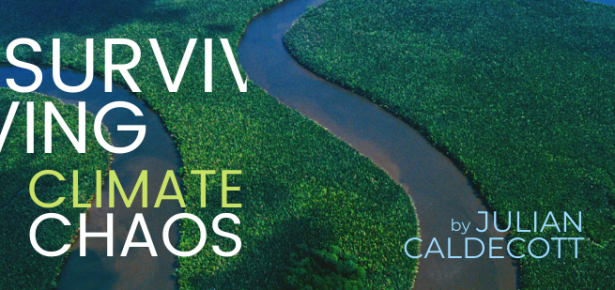
Surviving Climate Chaos is being published into a new world of lethal fires, floods and record-breaking temperatures, while the IPCC warns us that we are in the last decade before Arctic, oceanic and equatorial tipping points take all choices out of human hands. This emergency calls for far greater focus and impact in our climate change response, and for the strengthening of communities and ecosystems everywhere against climate chaos. It also calls for greater clarity in how we think about the social and ecological systems in which we live, the stresses that they experience, and how we and they adapt to new and dangerous circumstances.
“By assigning to local people clear, long-term rights to own, manage and benefit from ecosystems, they will become more interested in the condition of those ecosystems. By also establishing ecosystem management groups or forums where people can agree how to manage the ecosystems for which they are responsible, the ecosystems will tend to be managed in line with agreed locally-perceived priorities. Because of long-term tenure, community responsibility and forum accountability, these priorities will usually include an interest in the long-term supply, and hence sustainability, of a selection of ecosystem goods and services, for collective rather than private benefit. The forum itself will also preserve, restore or introduce practices of debate and consensus building within the empowered community.
“Some of these effects (e.g. biodiversity conservation, catchment services, carbon storage, conflict reduction, poverty avoidance) will also be appreciated as benefits by national society, creating an incentive among national stakeholders to support and replicate the community empowerment process. [But] some national benefits may be seen by outsiders, because of their different priorities, as unlikely to be adequately addressed or developed by local people, creating an incentive to improve local ecological knowledge by offering technical support, environmental education and networking with other communities where similar issues have been resolved. The net result of secure local tenure, local forums, and outside support offered but not imposed, will be healthier ecosystems and more engaged and confident local people at landscape level, and improvements to governance and environmental security at the national level, as a result of which the whole country will be better able to cope with climate chaos.” (page 285).
The role of small groups in all this is vital, for ensuring that no one is left behind, and for understanding and advocating its own interests while networking with others. “A small group can be potent if it wants to be, and partnerships are vital. There is nothing to stop everyone on Earth becoming an active part of the climate response by joining with others to make a difference. We are social animals and can achieve nothing outside of social systems, including the saving of the ecological systems on which we all depend. And one of the ways that a small local group can make a real difference is by joining forces with others to enact change and to insist on it. The more groups there are, and the more they talk with each other, the more valuable they all become, to each other, to local and national governments, and to the future.” (page 323).
Title: Surviving Climate Chaos by Strengthening Communities and Ecosystems
Author: Julian Caldecott
Paperback ISBN: 9781108793780
Hardback ISBN: 9781108840125
Latest Comments
Have your say!